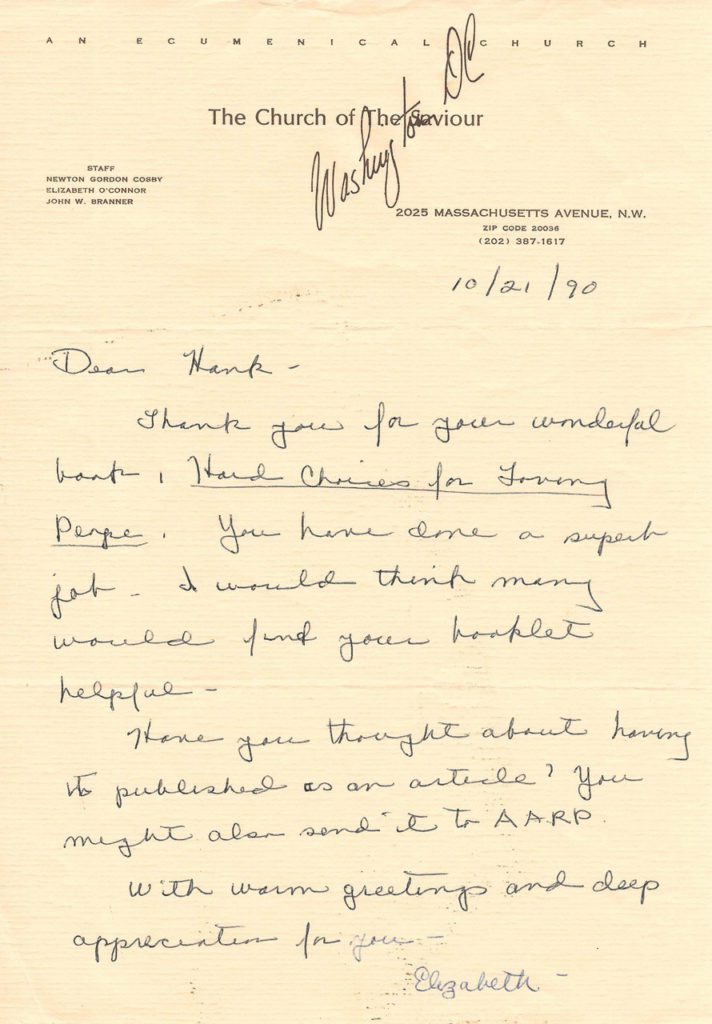Doesn’t a healthcare professional know what is best for a patient making medical decisions? Seems like a simple question and answer. They are the professional with much more experience and knowledge, of course they know what the best decision should be.
Maybe not.
David Hilfiker warned me against forcing my will on patients. I wrote about Dr. Hilfiker and his Alzheimer’s diagnosis in my last blog. It was he who helped me make a huge improvement in my book Hard Choices for Loving People. In the first edition of my book (1990) I discuss CPR and feeding tubes and offer help to those making decisions about these treatments.
Sometime in 1988 or ’89 I sent an early draft of Hard Choices to a dozen or so professionals for comment. Two people made the exact opposite observation about my writing.
“Hank, you are much too forceful”
Dr. Hilfiker wrote something like, “Hank, you are much too forceful in telling people what they should do with these medical decisions. You have disguised it as a discussion but it is obvious the conclusion you want people to make.”
 I had spent several years in a therapy group led by Elizabeth O’Connor. Besides her life as a therapist she was a very successful author. One of my “issues” then was not being clear about what I want and what I am feeling in my heart-of-hearts. Respecting her written work and her sensitivity as a therapist, I sent her a draft of Hard Choices. Her comment was, “Hank, I can’t tell where you stand on these issues. What do YOU recommend?”
I had spent several years in a therapy group led by Elizabeth O’Connor. Besides her life as a therapist she was a very successful author. One of my “issues” then was not being clear about what I want and what I am feeling in my heart-of-hearts. Respecting her written work and her sensitivity as a therapist, I sent her a draft of Hard Choices. Her comment was, “Hank, I can’t tell where you stand on these issues. What do YOU recommend?”
Truth is…they were both right.
For example, I felt so strongly that CPR offered no benefit to frail, dying, very old, nursing home residents that I wanted to guide my readers to choose a “No CPR” order. But I tried to get them to see my viewpoint through manipulation and condescension. After all, I had spent years working with these types of patients and was well-versed in the medical literature surrounding the topic.
David could see this very clearly with his years of clinical practice where he also had to advise patients and families on making end-of-life decisions. I had pretended like I was leaving it up to the decision-makers but I had worded it is such a way so they would only do “what I wanted.”
Elizabeth was confused because I did not clearly state what I believed. Not being a medical person, she could not see my hidden agenda.
I am forever grateful for their opposite assessments of my draft. What I did was state very clearly my opinions about specific medical treatments. But I put them in a section in the back of the book, plainly marked as my opinions. AND I softened the language earlier in the book where I have truly attempted to give the facts and let the readers draw their own conclusions.
The book … let’s them make up their own mind
Just yesterday, someone called the office looking to buy more copies of Hard Choices. Her hospice has purchased thousands over the years and they needed more. She said, “The thing I love about the book is the author gives people the information and let’s them make up their own mind.” I can’t tell you the number of times people have complimented my book saying how open, balanced, and nonjudgmental it is. It wasn’t that way originally.
This is a challenge for the healthcare professional. How do you present the facts of a case to a patient or family without forcing your will on them to make the decision you think is the correct one?
A family may feel guilty
Sometimes, physicians may not say enough to help these decision-makers. I am afraid some doctors bend over backwards respecting patient autonomy and trying not being too forceful in discussions that they are not truly helpful. They may say, “You can attempt to save her life and try CPR on your 95-year-old mother with cancer or not. It is up to you.”
So a family may feel guilty for not attempting a life-saving treatment. In this case, the physician can tell them clearly that CPR rarely works and often patients and families refuse it. Lay people need the best medical information as they face end-of-life decisions. Not being forced to make a decision but gently told the facts, options, and the pros and cons of different choices.
There is a balance somewhere in the middle of offering no advice and being willful. People say I hit it.
Thanks David and Elizabeth. You helped save me from myself.
Hank





